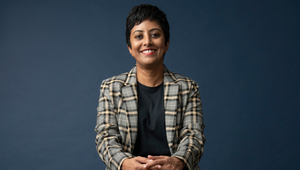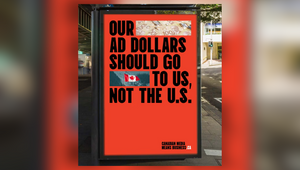
Shifting the Production Company Narrative with Taj Critchlow and Alex Henry

In a business that’s often known to be chock full of straight white men, the opportunity to see people who don’t fit that bill in positions of power has been something that’s gradually improving, but still, to this day, there’s much work to be done.
Even in a city like Toronto, often considered to be the most culturally diverse city in the world, this is true. A great example of this can be seen in the city’s production company scene, where specifically, the number of Black-owned businesses is shockingly low… although not nonexistent. Both Fela and Alfredo Films, for instance, are not only proud to boast incredible repertoires of work, representing the fact that there’s a very good reason existing mindsets and systems have a lot of room to grow and improve. After all, since when was skin tone a valid indicator of someone’s ability to output good product?
To this end, and to celebrate Black History Month, Fela founder Taj Critchlow and Alfredo Films partner and executive producer Alex Henry sat down with LBB’s Josh Neufeldt, discussing their respective journeys through the industry, what it’ll take to achieve more diversity down the line, and why this conversation can’t stop now.
LBB> Starting at the top, tell us about you! How did you get into the industry, and what made film production the thing that you wanted to do with your lives?
Taj> My entry point into the industry started in 1998 when I was Director X's executive assistant at HSI Productions in New York City. Here, we had the privilege to witness what it took to produce top-tier, budgeted commercials and music videos on a premiere level. As a result, we were inspired to start our own company; however, I noticed that no one who looked like us owned production companies of this stature at the time, except Hype Williams’ Big Dog Films.
I launched Fela at the peak of the pandemic in 2020 with my best friend, client, and business partner, Director X. Director X and I have had two other companies in the past, however, we lacked ownership and control. With this third company, our objective was to make a diverse, world-class shop that competes on a global stage while empowering diverse and inclusive filmmakers. Fela is a fully independent, Black and women-owned shop that has offices in Toronto and Los Angeles, with a presence in Europe.
Alex> My journey into the world of film production started from a simple love for storytelling. I've always found film to be a powerful way to express myself, kind of like a therapeutic outlet. It's amazing to see an idea that once lived on paper come alive through the collaboration of a passionate team.
Film school was where things really started to click for me. It opened my eyes to the possibility of making commercials, which I saw as short films in their own right. What really excites me about working in film is the chance to work with incredibly talented people - from directors and producers to creative minds who all share a vision.
So, in essence, my venture into film production was fuelled by my eagerness to tell stories and the magic of turning those stories into reality with a group of talented and creative individuals.
LBB> Obviously it takes a lot of spirit, hard work, and dedication to launch your own production company. What were these journeys like?
Taj> The journey was eventful because we came from the music industry and were immediately put in a box, even though some competing white-owned companies came from the same place. Being a Black owner came with its challenges, but ultimately, I understood from an early stage of my life that the road least travelled was my God-given mission. I wanted to be judged by my work ethic, service, talent, and work, not by my appearance or race.
At our first company, Creative Soul (where we made Drake’s ‘Hotline Bling’), we had to convince people that we knew the advertising business. Even after several years of doing ads, we had to assure clients that they could trust our experience, having been in the industry for a long time. We struggled just to get board flow. But, through hard work and persistence, the doors started to open slowly.
The paradigm shifted in a major way after the George Floyd global civil rights protests. When all industries had to reevaluate their business practices, we saw a big shift in board flow engagement and pitch opportunities. This always had me conflicted, because it took a Black man losing his life for people in positions of power to listen to the voices that have been overlooked and ignored. I don't believe in hands held out - instead, judge me by my character and performance. Not my skin tone.
Alex> Starting my own production company was a journey filled with determination, hard work, and a lot of learning along the way. I started the company when I was at Humber College, where I met my business partner, Holly Rowden. At the outset, we didn't have a clear vision for our company. We were creating branded and social content, thinking we were making commercials. I'd approach brands with our ideas, pitching them in hopes of collaboration.
A turning point came when we were fortunate enough to work with Starbucks and Facebook's internal team. It was then I gathered the courage to ask how to get our work on television. Their response: ‘You have to work with our advertising agency partners’, introduced me to a whole new aspect of the industry I was unfamiliar with. This sparked a period of exploration and learning about what agencies do and how we could collaborate with them.
Over the years, we built an impressive roster of directors and finally landed our first major job with Ogilvy. That project marked the beginning of our full-time engagement with commercials. However, the path to success wasn't straightforward. We faced numerous challenges and had to continually prove our worth to get our foot in the door. However, I believe what ultimately made a difference was our work ethic, talent, and fresh approach to production. These qualities not only helped us in forging amazing collaborations but also in creating standout work.
LBB> And what has it meant to you to be able to successfully achieve this?
Taj> It means everything to me because we were counted out by many. Nevertheless, we stayed on course and followed through with our plan - to make a shop that produced premiere commercials for the biggest brands and agencies, mirroring our success in the world of music videos. Through the grace of God, I bet on myself and the team, and here we are. There is no better feeling than following your dreams while attaining success on a global scale and being respected by your peers and heroes.
LBB> Despite working in a multicultural city like Toronto, still, there’s a general lack of ethnically-owned production houses. What do you think is contributing to this, and how does it feel to stand in the face of this?
Taj> Access. When I was coming up, Director X and I had to leave Toronto and make a name for ourselves in New York City. Icon director Hype Williams took us under his wing first and served as our mentor. He gave X the space he needed to learn and grow. Representation truly matters, and when you have someone who looks like you sitting across the table, there's a spiritual bond that naturally forms due to our shared ethnic background.
Since then, Fela has inspired many entrepreneurs to start their own companies; when they see us, they see themselves, and hope is given that they can do it too.
Alex> Achieving success in a field where diverse-owned production houses are rare, especially in a multicultural hub like Toronto, gives me mixed feelings. On one side, I'm filled with immense pride to be at the forefront of change. On the other, I'm acutely aware of the long road ahead and the need for broader awareness and action. It's startling to think that in all of Canada, the number of Black-owned production companies working with major agencies can be counted on one hand. This reality underscores not just a challenge, but a significant opportunity for growth and improvement.
With that said, the lack of representation in the industry isn't due to a single reason but a combination of factors. One major aspect is education and visibility. We need to show young people, right from their early education through to college, that the commercial industry offers a legitimate and exciting career path. It's crucial for them to see role models who look like them, making waves and creating content they admire. This visibility can inspire them to envision themselves in these roles, not just as participants but as leaders and innovators.
Another key to change is embracing risk - giving new talent a chance to prove themselves, even if it starts with smaller projects. It's important not to pigeonhole diverse creators into only diversity-focused content, but to trust their ability to tell a broad range of stories. This approach can open doors for more inclusive and innovative storytelling in the industry.
Standing against the current landscape is a complex experience filled with pride and a recognition of the work still needed. By addressing educational gaps, providing visible role models, and fostering opportunities for new voices, we can start to shift the narrative and raise the bar for everyone in the industry.
LBB> Expanding on this, do you expect to see more and more of this change in the coming years?
Taj> The change will come over time, through the creation of film industry programmes and initiatives that target underrepresented groups from the high school level. The creative arts in film need to be a curriculum in the school system. There has to be an intention to build a bridge to close the gap and mentorships in the early teen years are the starting point. This is why we play our part by hiring interns and making sure our sets are diverse in all aspects. The objective is to normalise this practice versus making it a mandate. There are an abundance of benefits that come with diversity besides the obvious; new ideas equal new business and that benefits everybody.
Alex> Absolutely. I'm optimistic about the possibility of change in the near future. The key is to keep the conversation going - not just talking the talk, but walking the walk. It's on all of us in the industry to not only acknowledge the issues, but to take concrete steps towards addressing them.
The beautiful thing about future generations is their resilience and innovation. Whether the industry makes room for them or not, they're going to make their mark. They're either going to break down the existing barriers, or carve out entirely new paths that could revolutionise the entire landscape.
LBB> Moving back to you, what are some of the biggest challenges you’ve had to overcome on your respective journeys, and how have you managed?
Taj> Starting a new business during the pandemic was hard as hell. We had to adjust and produce jobs in a new world with PPE and new guidelines. Other than that, competing in a highly competitive industry with an emerging talent roster came with its challenges; however, I am an advocate for the underdog because I’m one myself. So, breaking new talent in a world where some agencies tend to play it safe, and still make a brand that people want to work with because of what we stand for and because of our cultural storytelling brand, it's humbling.
Alex> Navigating my way into the industry and carving out a space for our company has been filled with challenges, especially when it comes to just being given a chance to show what we can do. Despite our global recognition and the quality of our work, we often find ourselves having to prove our worth more than others. This is partly because we're relatively new on the scene compared to some, but it's also due to entrenched systemic beliefs. Often, the resistance we face isn't intentionally malicious; it's more a product of existing systems and mindsets.
Growing up, I internalised the belief that, as a Black man, I'd have to work twice as hard to break through the systemic stereotypes that might prevent others from working with us. It's a tough reality to face, but rather than let it deter me, I've chosen to rise above it. I take pride in my heritage and the unique perspective we bring to our work. Our culture infuses our projects with authenticity and a distinct flavour of perseverance, making our productions not just unique, but truly special.
How have I managed these challenges? By focusing on the value we bring to every project. We let our work speak for itself and continue to push forward, knowing that our dedication and the quality of our output will eventually change perceptions. It's about not giving up, continually striving for excellence, and always being ready to seize the opportunities that come our way.
LBB> What does it mean to you to be a Black business-owner within this industry? And is there anything you’d like to say to those who might aspire to one day be in your shoes?
Taj> Being a Black entrepreneur in a white-dominated industry with ownership speaks volumes. Throughout history, we've been robbed of our land, our voice, our freedom, and our culture, and haven’t owned anything. The sports world and music industry are prime examples of where we dominate but lack ownership. Fela’s mantra is ‘Own Your Culture. Tell Your Stories’, because too many times our history has been retold in a misinformed way. By having company owners such as Jordan Peele, Kevin Hart, Ava Duvernay, Spike Lee, Ryan Coogler, and Issa Rae, just to name a few, great stories have been shared with the world. It's our turn now, as unapologetically Black men from Toronto, Canada, it's our time to take control of the narrative.
LBB> And how do your backgrounds reflect on the ethos of your production houses? How do you celebrate your heritage?
Taj> Our ethics are a reflection of the culture we created at Fela. We're a family-oriented, spiritual, creative movement that empowers creatives from all walks of life.
LBB> Finally, with it being Black History Month, what does the occasion mean to you? And is there anything extra you’d like the readers to know?
Taj> Black History Month is a great acknowledgment of my people and our contribution to civilization, but all cultures and customs should be taught in the school system - it's the only way we learn about each other and build tolerance and love for each other as one people.
Lastly, I’ve seen great progress made in our industry over the past few years. Many BIPOC creatives I know who previously would have been overlooked are now thriving. However, there’s still work to be done. I know talented folks who get most of their opportunities for the year during Black History Month, and I encourage people to give opportunities to emerging Black talent outside of when it directly relates to their identity.
Alex> In the great words of Issa Rae, “I'm rooting for everyone Black.” It’s a time of celebrating Black excellence, accomplishment and resilience.















